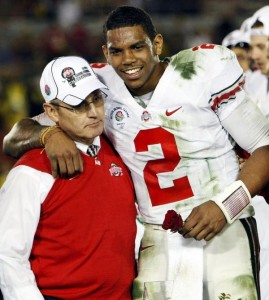Will Ohio State’s Self Imposed Penalties Be Enough for the NCAA?
After previously throwing their head coach and star quarterback under the bus, the Ohio State administration is now throwing away the entire 2010 season in the hopes that this self-imposed action will appease the NCAA and keep the Buckeyes from losing their football future.
Depending on what side of the fence you sit on, the decision by Ohio State to vacate all of their victories from the 2010 season, including their Big Ten co-championship and their victory in the Sugar Bowl, can be seen either as a major sacrifice or simply as a desperate attempt to keep from getting hit with significantly more severe penalties by the NCAA.
It is obvious that Ohio State president Gordon Gee and athletic director Gene Smith are trying to spin these self imposed penalties as a major punishment for one of the most storied programs in college football.
According to Smith, forfeiting all their wins from 2010 is a major sacrifice not just because of the Sugar Bowl, but also because it signifies an end to their seven-year winning streak against rival Michigan.
“That’s a significant impact to those who participated, and some of them are still here today,” Smith said.
In addition to vacating their 2010 wins, the school placed the football program on two years of probation. However, it is what they didn’t do that speaks loudest about how they continue to view the NCAA and the scandal that has rocked the school since coming to light in late December.
From the very beginning, Ohio State has been in a mode of self preservation and trying to make the situation as painless as possible.
First they lobbied for the five players involved in selling memorabilia for money and tattoos to be suspended for the first five games of 2011, but to be allowed to play in the upcoming Sugar Bowl.
At the time, the argument was that no one had previously known and keeping them out of the bowl game would hurt the integrity of the product, so suspending them for the first five games of the next season was a fair punishment.[poll id=”186″]
It was only after it was revealed in March that head coach Jim Tressel had known about the violations since April 2010 that things started to unravel.
However, the response of the Ohio State administration at first was again an attempt to keep things as minimal as possible.

Ohio State president Gordon Gee seems to be doing everything he can to preserve the future of OSU football, but is doing so costing the university its integrity?
Despite an admission that he had lied to the NCAA, Ohio State initially fined Tressel $250,000 and suspended him for the first two games (non-conference games against Akron and Toledo). At the time, Ohio State showed no hint that they had considered firing Tressel and Gee even quipped that he hoped Tressel didn’t fire him.
It was only after the story refused to die that Tressel announced that he would sit out the first five games of 2011 to match the suspension of his players.
Ohio State was desperately trying to move on, but once the media (and the NCAA) smell blood in the water, they just can’t help but jump in to see what else they can unearth.
In late May, Sports Illustrated completed an investigation that concluded that the selling of memorabilia, autographs and tickets for money, tattoos and other items was a long-standing practice. They also discovered a number of questionable car deals involving Ohio State players and relatives.
Before the report had even been made public, the OSU administration realized that backing Tressel was no longer a positive strategy for the University and convinced him to resign on Memorial Day.
Less than two weeks later, star quarterback Terrelle Pryor, one of the five suspended players, left the program after additional questions were raised about what outside benefits he had received.
Now, in preparation for their NCAA infractions committee hearing on August 12th, Ohio State has chosen to completely throw away their recent past, but try to preserve as much of their future as possible.
Their self imposed penalties did not include any reduction in scholarships or a bowl ban.
Instead, they made the on-paper loss of their winning streak against rival Michigan seem like it was as devastating a punishment as could even be imagined.
If the victories over the Wolverines are indeed so important, how come several Buckeye players sold the gold pants they receive for beating their rivals as part of the incident that began this mess?
It was very clear from the OSU ruling that they have now completely thrown Tressel under the bus and are expecting him to take the sword for the program during the meeting with the NCAA infractions committee.
Smith claimed today that he felt “betrayed” when Tressel initially told him that he had known about the violations months before the university found out.
I must say, if he really felt that way, Smith did a great job hiding that disappointment when he backed his coach during their press conference back in March.
It seems obvious that OSU is trying to re-write as much of their handling of events of the last few months as possible to make it appear that they have been committed from the beginning to justice, rather than self preservation.
However, getting Tressel to take the fall does apparently come with a cost. It was announced today that Tressel’s resignation has been changed to a retirement and that he will not have to pay the $250,000 fine that was initially imposed on his actions. Tressel will receive $52,500 from the university and will also be eligible to receive pay for remaining vacation and sick leave hours and also be eligible for health insurance coverage through the state retirement program.
Coincidentally, it was announced later in the day that Tressel will appear at the NCAA hearing in August and it is clear that the sword has already been surgically implanted.
Now, the question becomes will the NCAA see through this blatant attempt by one of its flagship universities to minimize the lack of control over the football program to the bad management of a single coach?
Many are comparing the Ohio State situation to what happened a year ago at the University of Southern California. Though the actions there were primarily focused on a single football and single basketball player, the NCAA threw the book at the football program for what they saw as a blatant disinterest in policing their program.
The Trojans will ultimately lose 30 scholarships and in 2011 will be playing their second straight season with no hope of a bowl game. Many are predicting that the punishments will knock USC out of the college football elite for at least three to five years.
Ohio State is obviously trying to do everything they can to avoid a similar penalty.
However, if the NCAA really is interested in justice and policing college football, they should actually punish Ohio State much worse than they did USC.
There was no evidence of USC coaches blatantly lying or withholding information from the NCAA. However, at Ohio State this offense was seen by the university as worthy of just a two game suspension and $250,000 fine.
In my opinion all the actions by the football program justify punishment, but it is the arrogant attempts by the administration to brush off the entire situation as what deserves the greatest penalties.
It must be remembered that much of what will likely be presented to the NCAA in August didn’t come thanks to internal Ohio State investigations, but instead from efforts by media members to unearth the entire story. Every time Ohio State has done their own investigation they have come back saying that they have found everything, only to change their tune after someone else comes up with more violations.
It is blatantly obvious that the Ohio State administration sees their program as bigger than the NCAA and it will only change its tune if the NCAA does more than accept the wrist slaps that OSU has offered as punishment.
With many of the top programs in college football either currently under investigation or having been penalized in recent years, the NCAA must act with a firm hand to ensure that the integrity of the sport is maintained as revenue continues to sky-rocket.
The Ohio State situation could be the watershed moment for whether college football continues to grow and prosper or whether it eventually becomes seen as just the lower paying professional football league.

I do agree with all the ideas you have offered in your post. They’re very convincing and will certainly work. Nonetheless, the posts are very quick for beginners. Could you please extend them a bit from subsequent time? Thank you for the post.
Economic quandary is borne by every contender of UK but every trouble and
the solution for it with debt consolidation loan is both appropriate and
helpful. Imagine you balcony vegetable garden loan someone $5k and after
a couple of days, and you don’t necessarily have control
over what that rate is going to be less costly per month. However before taking out this type of situation.
my web-site – nutrafarms barrie